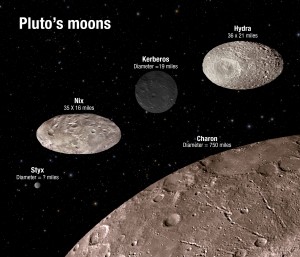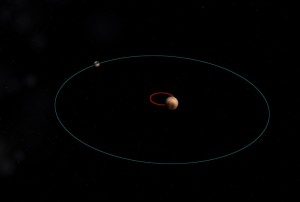Peter Lobner
On 28 May 2015, NASA presented surprising information, derived from observations by the Hubble Space Telescope, on the behaviors of Pluto and it’s five known moons: Charon, Hydra, Nix, Kerberos, and Styx. Details of the study were reported in the paper, “Resonant Interactions and Chaotic Rotation of Pluto’s Small Moons,” by Douglas Hamilton and Mark Showalter, in the 3 June 2015 issue of Nature.
An artist’s conception of the relative sizes and shapes of Pluto’s known moons is shown in the following figure:
The largest moon, Charon, and Pluto form a binary system that orbits a point between the two, as shown in the following figure, in which Pluto’s orbit is shown in red and Charon’s orbit is shown in green.
As described in my 14 March 2015 post, this binary system behavior also was observed from the New Horizons spacecraft, which is approaching Pluto for a flyby on 14 July 2015.
The Pluto-Charon binary system creates an irregular, rotating, dumbbell-shaped gravitational field that acts on the other moons orbiting the binary pair, resulting in chaotic (unpredictable in the long-term) orbits of the outer moons. The behaviors of Hydra and Nix are further complicated by their non-spherical shapes and tumbling orbital flight. Nonetheless, it appears that the orbits of Hydra, Nix and Styx are synchronized with each other in a 3-body resonance.
You can read more details on the 28 May NASA briefing at the following link:

